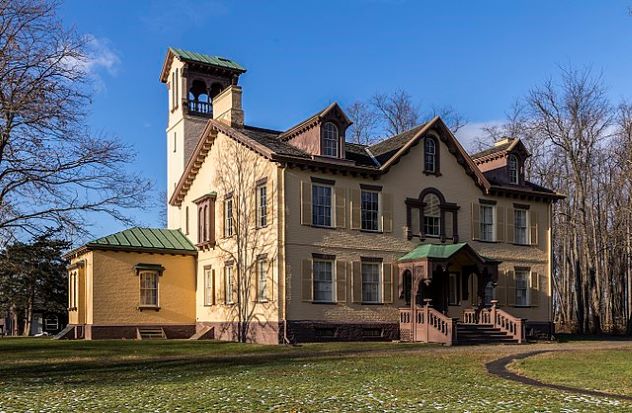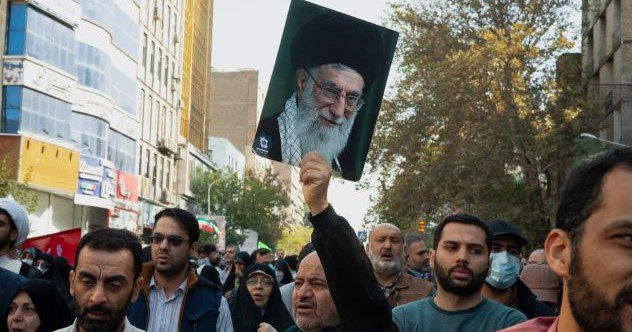[ad_1]
Have you ever wondered where world leaders go in the afterlife? American presidents, for instance? Those who believe in ghosts might tell you they do know where. Various places around the nation are said to be haunted by presidential specters. The White House, for one, is said to harbor Abraham Lincoln’s ghost. George Washington reportedly appears in his Mt. Vernon plantation home. Let’s take a creepy tour of ten other spots dead presidents had made into their afterlife hangouts.
Related: 10 Celebrities Who Had A Terrifying Ghostly Experience
10 Monticello
The third president, Thomas Jefferson, was an architect who designed his own home in Virginia. Named Monticello (Italian for “little mountain”), it was where he spent his remaining years after his presidency and where he died on July 4, 1826. Some say he never left.
Visitors to Monticello have reportedly heard Jefferson’s characteristic whistling as he walked through the house. His serene and patriarchal apparition has been seen at his writing desk, at the entrance hall, or beside his wife, Martha, in the dining room. A psychic paranormal enthusiast Hans Holzer brought to the house sensed Jefferson’s presence in his bedroom, dining room, and South Pavilion—areas of Monticello where Jefferson spent most of his time.
Curiously, though, there have never been sightings of ghosts of any of the slaves Jefferson owned in Monticello, not even that of his mistress, Sally Hemmings. This is remarkable, considering their graveyard was recently unearthed a mere 2,000 feet (610 meters) from the main house.[1]
9 Hollywood Cemetery
Hollywood Cemetery in Richmond, Virginia, is haunted by numerous specters. Mysterious whispers and groans from Confederate dead, a phantom dog, and even a vampire are said to bedevil the place.
Two U.S. Presidents are buried in the cemetery: James Monroe and John Tyler, as well as Confederate president Jefferson Davis. Monroe’s remains were transferred to Richmond from its original resting place at the family crypt in New York. Apparently, Monroe’s spirit was confused by the move. His ghost was seen lingering awhile at the crypt before disappearing and reappearing in Richmond. Since then, he has been seen at his grave, sitting quietly in contemplation, nursing his shoulder where a musket ball from the Revolutionary War was embedded. Otherwise, he might be spotted standing, tall and muscular as he had been in life, inside his gothic-style tomb.[2]
8 U.S. Capitol
Numerous creepy legends surround the Capitol, as the building itself has an aura of spookiness, especially with a crypt meant for George Washington within its walls. Oft-told tales include that of a demon cat bringing omens of tragic events and phantoms of a Civil War soldier roaming the Statuary Hall and William Taulbee, a former congressman, shot in a stairwell.
But Taulbee wasn’t the only one to meet his end at the Capitol. Former president John Quincy Adams was a representative who opposed the Mexican War as an unjust war of conquest that would encourage the expansion of slavery. When the House came to vote to honor officers who served, Adams thundered “No!” and promptly collapsed from a stroke, dying two days later. Since then, people have reported hearing Adams’s disembodied “No!” echoing through the halls.[3]
7 Hermitage
Twenty miles east of Nashville, Tennessee, we find Andrew Jackson’s palatial Hermitage, built for his beloved wife Rachel, on a secluded meadow she chose. In 1819, Jackson had an English gardener create a perfect garden where Rachel could relax. She found her favorite pleasure spot among its blooming flowers, and when she died in 1828, the grieving Jackson had her buried there. Every afternoon after that, he would visit her tomb, smoking a cigar and talking to her. “Heaven will be no heaven to me if I do not meet my wife there,” Jackson had said, and when he died, he was buried near Rachel.
Since then, there have been accounts of footsteps in the garden, accompanied by the smell of cigar smoke near the tomb. The garden gate would swing open by itself, and Jackson’s presence might be felt by visitors. In addition, a loud sound of a horse running through the house and mysterious whispers have been heard. Was this Jackson riding around as in his military days?[4]
6 Lindenwald

Before it was Lindenwald, the two-story, Federal-style mansion at Kinderhook, New York, welcomed such visitors as author Washington Irving and Vice-President Aaron Burr. Irving drew much inspiration from the surrounding area, with its legend of a headless horseman, for his classic tale “The Legend of Sleepy Hollow.”
The house was called Lindenwald by Martin van Buren, who bought the property in 1839, moving in the next year after his time in the White House. He remodeled the place into an Italian Gothic mansion where his son John and his wife also moved in. Unfortunately, it was where Van Buren died in 1862. Sadly, John gambled the house away, losing it to Winston Churchill’s grandfather Leonard Jerome.
Many ghosts are reported at Lindenwald. Burr has been sighted roaming the orchard, and what may be his footsteps are heard in the upper rooms. The orchard is also haunted by Van Buren’s butler, who hanged himself there, and the spirit of a murdered woman walks among the apple trees.
Van Buren’s ghost frequently appears in the dining room with John. They can be glimpsed as if enjoying food and the company of guests. The ex-president might sometimes be observed loosening the corset under his waistcoat, worn to hide his paunch, just as he did in later life.[5]
5 The Willard Hotel
Built in 1818, the Willard Hotel on Pennsylvania Avenue in Washington, D.C., has an illustrious history. Its guest list includes Charles Dickens, Mark Twain, Walt Whitman, and Harry Houdini. Even its ghosts are notable: One is First Lady Jane Pierce, who retreated to the Willard to deal with the tragic death of her 11-year-old son in a train accident. She was rumored to have died of melancholia at the hotel (she actually died in Andover, Massachusetts). Her spirit is said to roam the corridors still.
It was President Ulysses S. Grant’s habit in the evenings to walk over from the White House to the Willard two blocks away. There, he would sit in the lobby, drinking and smoking his favorite Cuban cigars. He became such a regular that people seeking favors would come up to him there, and consequently, Grant was the first to call them “lobbyists.”
And it would seem Grant never left. He has been seen walking through a corridor called Peacock Alley. Employees and guests can still sometimes smell the odor of cigars in the lobby and certain areas, especially late at night. Since the hotel is a 100% smoke-free zone, the smell has no known source—physically, at least.[6]
4 The Menger Hotel
The historic Menger Hotel near the Alamo in San Antonio is a hotbed of paranormal activity, and its bar is particularly so. Its troop of ghostly denizens includes a Lady in White, young children, cowboys, and even a phantom playboy who lies in wait to pick up a (living) date at the bar. They might be behind the numerous poltergeist phenomena, electrical anomalies, strange shadows, EVPs, and spectral photobombs on the premises.
However, the most famous ghost in Menger is Theodore Roosevelt. During the Spanish-American War, Roosevelt used the bar as his impromptu recruitment office, enticing cowboys who came in to join his Rough Riders. One time, Teddy actually rode his horse into the bar to fire up his prospects.
Staff and guests have seen Teddy’s ghost sitting at the bar, wearing his old military uniform and having a drink, just as he did during his recruiting days. He terrified a new janitor by materializing late one night, prompting the panicked young man to quit his job. An EVP caught a voice saying, “Get your horses,” recalling Teddy’s stunt with his steed.[7]
3 Wilson House
At Embassy Row in Washington, D.C., stands the Georgian Revival house where Woodrow Wilson settled after his presidency in 1921, hoping to recover from the paralyzing stroke that hobbled him in his final years. Wilson had planned to set up a law practice and do some scholarly work, but it never panned out, and the disabled patient died in his bedroom in 1924.
Since then, the Wilson House has earned a reputation as possibly the most haunted house in the capital. Wilson’s despondent ghost still walks its halls, and the beat of his cane as he climbs the stairs has been heard. Audible from the bedroom are a man’s sobs. A transparent figure in a dress shirt, tie, and jacket appears seated behind the desk. The lower portion of his body is covered by a lap robe or blanket, and the face reveals disfigurement from a stroke, a sad, faraway look in his eyes.
A caretaker quit in 1969, unable to stand the strain. An employee of the National Trust for Historic Preservation, a group not given to acknowledging the paranormal, reported the distinct playing of Wilson’s Steinway piano in the drawing room when no one was there.[8]
2 Driskill Hotel
Jesse Driskill was a cattle baron who grew rich by supplying the Confederate army with beef. With his war profits, he built a Romanesque Revival hotel in Austin, Texas, in 1886. Maybe because it was built with blood money, spooks and ghosts were attracted to it, making the Driskill one of the most haunted hotels in America.
Chief among these restless spirits is Jesse Driskill himself. In one sighting, a hotel guest was awakened at 3 am to find Driskill standing in his room, looking out the window while smoking a cigar. The hotel has the customary jilted bride who committed suicide, the giggles of a child who died from a fall down the stairs, and even a haunted painting.
The most prominent Driskill ghost is President Lyndon Johnson, who first dated his wife, Lady Bird, at the hotel. Johnson also hosted post-election parties and strategy sessions at the Driskill. He might still be seen sitting in a chair around the area where he used to watch election results. Or else, guests might see his and his wife’s reflection in mirrors in the ballroom. It seems LBJ is reluctant to leave one of his favorite Austin hangouts.[9]
1 Nixon Library
The Nixon Library and Museum in Yorba Linda, California, houses archives and exhibits documenting Richard Nixon’s life and presidential legacy. Of course, it is also where one can visit Nixon’s birthplace and his grave. But it seems visitors might not only encounter the president through his memorabilia, films, and documents. There is his ghost as well.
A night watchman has reported a ghostly figure passing through the locked door of the birthplace. A green mist hovers over Nixon’s grave. In the Watergate display area, machines frequently break down, and tapping sounds are heard. A psychic said that this was Nixon’s way of distracting people from perusing the Watergate materials. Ghost tour participants reported unexplained cold sensations in the dimly lit exhibit hall. Nauseating odors and buzzing sounds were detected at various locations. Apparently, this is an area that agitates Nixon’s spirit.
A medium revealed that the only exhibits Nixon enjoys are the memorabilia of his early life—school essays, old photos, love letters to Pat, and his naval service records. Nixon’s spirit also told him he visits his birthplace every night.[10]
[ad_2]
Source link

